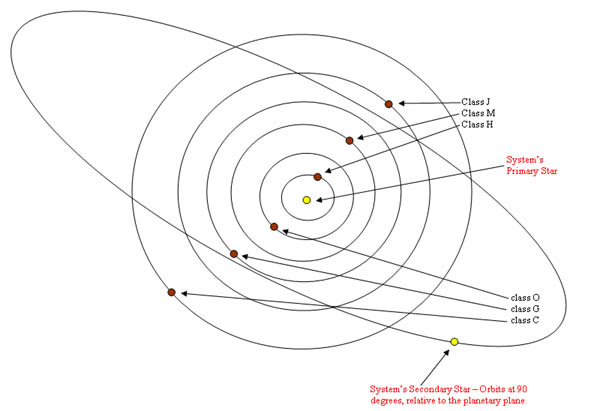Luxis system
| Luxis system | |

| |
| Astrographical Information | |
|---|---|
| Region | unclaimed |
| Sector | Duronis Sector |
| Affiliation | Independent |
| System Information | |
| Type | Binary |
| Sun(s) | 2: (Luxis, Sebris) |
| Planets | 6 |
| Other Members | asteroid belt |
Of Interest |
Duronis II, Subspace Sandbar |
| Inhabitants | |
Native Species |
Laudean |
| Other Species | numerous |
| Last Updated: 239104.26 | |
| Luxis system | Star-A • I • II • III • IV • Star-B • Belt • V • VI |
Historical Note
Obviously Starfleet has called the system Duronis, so the primary star would be Duronis A and the secondary Duronis B, the planets would be Duronis I, Duronis II, etc. The Laudeans, however, call their primary sun Luxis and the secondary star Sebris. The planets (in order) are called Dil'ahn, Til'ahn, Rhil'ahn, Nil'ahn, Sil'ahn, and Pil'ahn. The suffix 'ahn means "world". Til means "home". Dil, Rhil, Nil, Sil, and Pil were brothers in Laudean mythology/cosmology. Luxis and Sebris were their parents. Til'ahn's two moons are Jareb (class D), and Mareb (class Y).
Anomalies
- Asteroid Field: Circling the system secondary (once a class M, but destroyed by tidal forces when the secondary star was captured by the gravity well of the primary star. Some of the larger remnants still have very thin atmospheres and could be considered class-D.)
- Subspace Sandbar: This covers much of the system, but there is one narrow corridor inside of which warp travel is possible. This allows Warp 2 (max speed in the corridor) travel to within 6 hours of the system's star (full impulse speed allowed from there). The Laudeans found this corridor early in their space travel history using their Fielding powers.

Interstellar Location
The Duronis system is not located within Federation space. In a region of relatively unexplored space, the Duronis system is located in unclaimed territory between the Romulan Star Empire and the Zalkonian Suzerainty (in the Beta Quadrant.)
To view the Duronis system's location in comparison to the rest of the United Federation of Planets see this starchart.
Nearby systems
(In order of nearest to furthest)
- Sector 9569
- The Zeta Gellis Cluster
- Systems in Zalkonian Space & Systems in Romulan Space
- The Typhon Expanse (= hazardous)
- Zakdorn
- Deep Space 6
- Starbase 185
- Jouret
- Ivor
- Deep Space 5
- The Typhon Sector
- Tarod